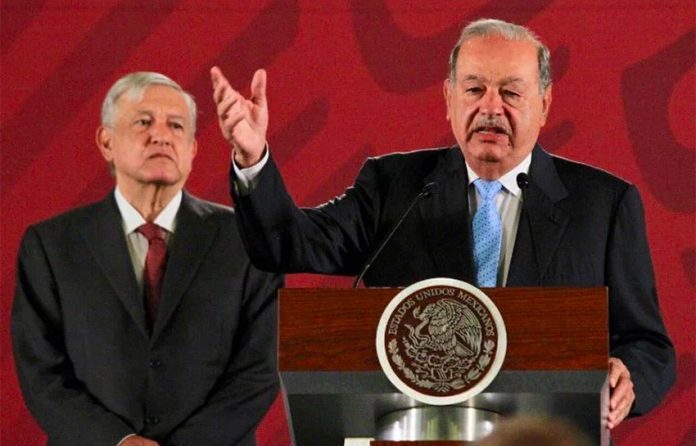Mexico is locked in combat with an invisible enemy, whose menace is sweeping the globe. Spiderman, Superman, Batman and the Avengers are nowhere to be found. But one homegrown hero has stepped out of the shadows to fight: SuperSlim.
Carlos Slim, the famously unassuming telecoms mogul, has been hailed as a savior since his charitable foundation announced last week it would fund production of a promising AstraZeneca and University of Oxford Covid-19 vaccine as Mexico grapples with the world’s third-highest coronavirus death toll. Little wonder that a cartoonist in the national newspaper El Economista portrayed the 80-year-old magnate pulling open his shirt to reveal a Superman “S.”
For Mexico’s (and once the world’s) richest man, who prefers to think of charity as “social investment,” the move was in character. As he told his biographer, Diego Osorno: “Our concept focuses on achieving and resolving things, rather than giving. We don’t go around like Santa Claus.”
But for the cash-strapped government of leftist nationalist President López Obrador, the deal was a godsend as it struggles to tame a pandemic that has killed nearly 60,000 people.
The foundation, which Slim set up nearly 35 years ago, will stump up an unspecified sum to help produce 150 million to 250 million doses of the vaccine in Argentina and Mexico. López Obrador says that means a free, universal Covid-19 vaccine will be available in the first quarter next year — and volunteered to be the first to be inoculated.
![]()
It is not the first time Slim has ridden to López Obrador’s rescue. But a populist president who rails against Mexico’s neoliberal past, and a billionaire who made his fortune because of it, nonetheless make an unlikely duo. In fact the man-of-the-people president and the billionaire América Móvil boss go back a long way: López Obrador tapped Slim to help him spruce up the capital’s grungy historic center when he was mayor from 2000-05.
But as López Obrador barrelled towards his landslide presidential victory in 2018, Slim admitted to feeling queasy about the investment climate if he won and went ahead with a pledge to scrap the US $13-billion Norman Foster-designed Mexico City airport, which the magnate backed.
López Obrador did just that, straining the relationship between them, and only in the past year has there been a rapprochement. Last August, López Obrador fulsomely praised Slim for helping engineer a deal to settle a row over gas pipeline contracts he considered exorbitant.
The love-in continued, with Slim throwing his weight “100% behind” the president’s goals, including combating corruption and developing Mexico’s poor southeast through mega-projects. Indeed, a consortium led by Slim’s companies in May won a tender to build a section of the government’s flagship Maya train project and Slim has promised to invest $5 billion in infrastructure.
In February, when López Obrador summoned the business elite for a fundraising dinner at the National Palace, Slim was seated at his side. When López Obrador visited U.S. president Donald Trump at the White House in July, Slim joined the two leaders on the top table at a dinner with businesspeople.
Slim has graciously allowed López Obrador to bask in the credit for the vaccine program. But the president sometimes has a funny way of saying thanks: within days of the announcement, he called for an ethylene plant contract between loss-making state energy company Pemex and a consortium of Brazil’s Braskem and Mexico’s Idesa to be scrapped, or at least revised. Slim’s Inbursa bank is a major Idesa creditor.
The $5.2-billion plant was a landmark investment because of its size, but Pemex no longer has a glut of ethane — the raw material used in the plant — and is struggling to meet the terms of a contract the president considers unfavourable to the state company.
But he appears to be overlooking the fact that if Pemex fails to fulfil its contract, Braskem Idesa has an option to force it to repay all the investment plus return on capital. Pemex already has debts of $107 billion. Averting that disaster could be the next test for SuperSlim’s negotiating skills.
© 2020 The Financial Times Ltd. All rights reserved. Please do not copy and paste FT articles and redistribute by email or post to the web.
